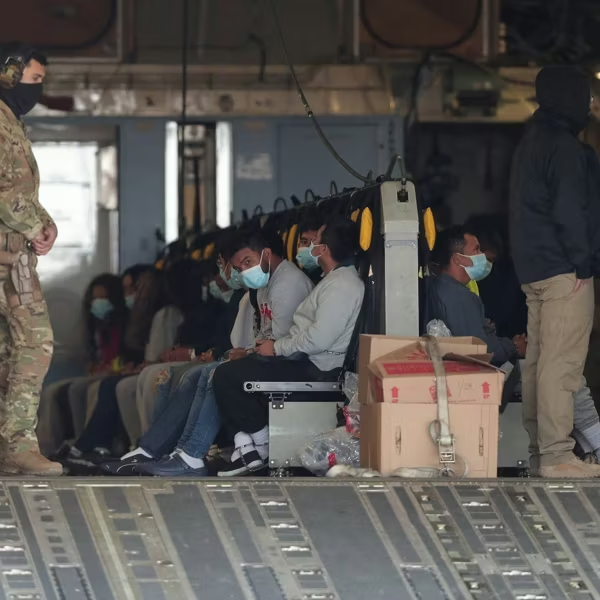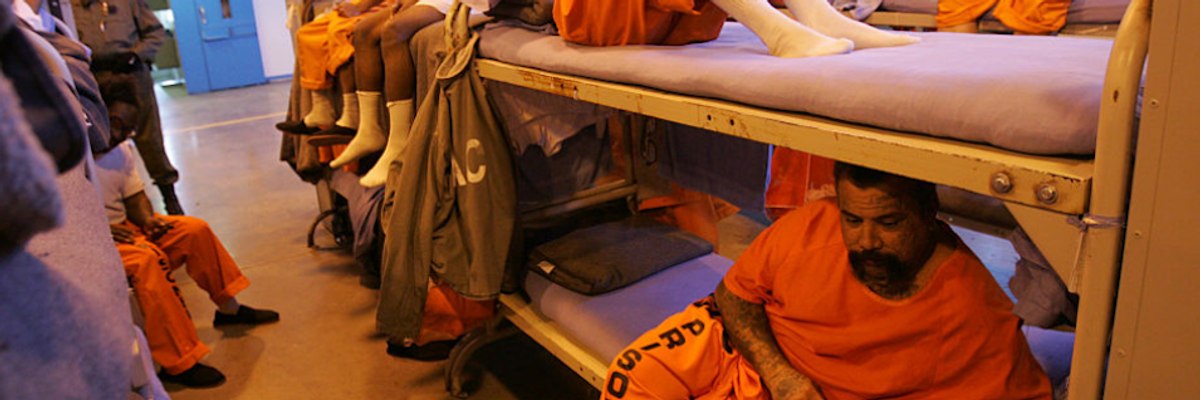Covid-19 is spreading rapidly in U.S. jails and prisons because of a lack of healthcare and access to basic necessities such as soap and disinfectant, a report published Thursday from Essie Justice Group and Color of Change has found.
The report--titled "Lives on the Line: Women with Incarcerated Loved Ones and the Impact of Covid-19 Behind Bars" (pdf)--is a survey of over 700 people with incarcerated loved ones across the country. It draws attention to the harm caused to women, especially Black women, by the "converging forces" of the coronavirus pandemic and mass incarceration. The authors found that the pandemic has "aggravated the financial hardship and increased childcare responsibilities, isolation, and physical and psychological stresses faced by women and people with incarcerated loved ones."
"Incarcerated people and their loved ones are dealing with multiple pandemics at once: racism, mass incarceration, and Covid-19."
--Erika Maye, Color of Change
"When Covid-19 hit, we knew that the dual crises of the pandemic and mass incarceration would fall heavily on women caretakers and disproportionately on Black women," said Gina Clayton-Johnson, founder and executive director of Essie Justice Group. "That is because one in two Black women today have a loved one behind bars. This report makes that impact clear and condemns the failure of government actors to intervene in the increasingly dangerous conditions for Black and Brown families hardest hit by mass criminalization."
Among the survey's key findings:
- 62% of respondents said their loved ones behind bars are scared they will lose their lives to Covid-19.
- 52% of survey respondents reported that their incarcerated loved one has at least one underlying medical condition that the Center for Disease Control has identified as "high-risk" for severe illness or complications should they contract Covid-19.
- One third of respondents reported that their incarcerated loved ones did not have access to medical care; only 16% said the facility where their loved one is practiced any social distancing while only a staggering 7% believed that their loved one had adequate access to basic necessities to prevent the spread of Covid-19, such as soap.
- Incarcerated people are being deprived of their due process due to Covid-19, with 33% reporting that their loved one's attorney meetings had been canceled and 11% reporting that their loved one's release date had been delayed due to the virus.
- 92% said their loved ones had a home to go to if released from prison to quarantine, showing that women with incarcerated loved ones and their families are able to welcome home incarcerated people if they are released.
"These survey results show incarcerated people and their loved ones are dealing with multiple pandemics at once, racism, mass incarceration, and Covid-19, and it's affecting their mental health," said Erika Maye, deputy senior director of criminal justice campaigns for Color of Change.
"Most prisons and jails have canceled in-person visits and increased restrictions on how often and for how long people can talk to their loved ones by phone, leading to increased feelings of anxiety and isolation," Maye continued. "That's why, in addition to demanding the release of incarcerated people, we're calling on the Senate to pass the Martha Wright Prison Phone Justice Act and lower the cost for families to stay connected with incarcerated loved ones."
The pandemic has ravaged the U.S. prison population and the correctional staff who work in those detention facilities. According to a research letter published in the peer-reviewed journal JAMA, Covid-19 cases in U.S. federal and state prisons were 5.5 times higher--and death rates three times higher--than in the general population from the end of March through early June.
The Marshall Project, which in partnership with the Associated Press has been tracking coronavirus infections and COVD-19 deaths in federal and state prisons, currently counts more than 108,000 cases nationwide.
The new report highlights one prison, San Quentin State Prison in California, where as of early July more than 2,200 inmates had tested positive for the virus, and where at least 25 prisoners had died as of August 19.
The advocacy group Death Penalty Information Center notes that Covid-19 has killed more death row prisoners in California than the state has executed in the past 27 years. On August 19, Dean Dunlap became the 13th condemned inmate to die from the disease.
Prison overcrowding, poor sanitary conditions, and high rates of chronic illness among U.S. prisoners are making it exceedingly difficult to contain and control outbreaks behind bars.
The report calls on government and prison officials to release incarcerated people so that they can return home and respond to the unique experiences that women with incarcerated loved ones have during this crisis. The full list of report demands includes:
- The closure of prisons, jails, and detention centers.
- Safe return of incarcerated people, with adequate financial and logistical support for newly released people and for their loved one welcoming them home.
- All possible measures taken to protect the health of lives and incarcerated people.
- Increased access to incarcerated loved ones, including free phone calls and video visits and daily communications and updates on their health and well-being.
- Ensure that delays in court closures and programs do not extend loved ones' incarceration.




